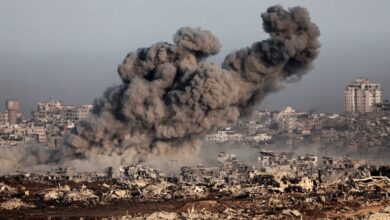A report by human rights watchdog Amnesty International concluded Tuesday that widespread abuse in Iraqi prisons will likely continue under the new government as leaders are distracted by violence, the stagnant economy and poverty.
The 12-page report offered a grim view of prison conditions in Iraq, describing state-run detention cells as breeding grounds for systematic torture and sickness.
Torture and abuse has long been a part of Iraq's prisons system, going back to Saddam Hussein's regime before he was ousted in 2003 by the U.S.-led invasion.
It has since continued, even in American-run prisons, most notably at the Abu Ghraib detention center outside Baghdad. But U.S. forces turned over full control of prisoners to Iraq's government last year, "without any guarantees that they will be protected," the Amnesty report states.
"There is every likelihood that torture and ill-treatment will remain widespread," it concluded.
Prime Minister Nouri al-Maliki's spokesman could not immediately be reached for comment. But state media reported Tuesday that the Interior Ministry's inspector general is investigating 58 alleged cases of human rights abuse committed by the agency's employees last year, including some against prisoners. Attempts to reach ministry officials for more details were not immediately successful.
An estimated 30,000 men and women are currently in Iraqi custody, including about 1300 on death row. In 2008, Iraq's parliament voted to join most of the rest of the world in banning cruel, inhuman and degrading treatment of prisoners by signing onto the UN Convention Against Torture. But Iraq has still not filed its paperwork with the UN, and "there is no indication that the government intends to," the report said.
Kurdish lawmaker Mahmoud Othman said parliament intends to ratify the UN treaty, but has been too busy trying to stabilize Iraq to address it yet. "The convention enjoys the support of all political blocks and nobody rejected it in the previous parliament," Othman said.
Tuesday's report follows a similar charge last week by Human Rights Watch that accused elite Iraqi troops controlled by al-Maliki's office of holding prisoners at a secret jail and torturing inmates at another facility.
Al-Maliki has denied the allegations, but they raised fresh concern about the government's treatment of detainees just six months after the US military handed over full responsibility for the prison system to the Iraqis as part of its preparations to withdraw from the country by the end of this year.
Meanwhile, al-Maliki announced the arrest of the army commander who was in charge of a Shiite neighborhood in northwest Baghdad where a bomb outside a funeral tent killed at least 51 people and wounded scores last month.
The commander, Col. Ahmed Taha al-Obeidi, is in custody and awaiting trial for failing to prevent the blast, and at least seven other officers will be punished.
Also Tuesday, a roadside bomb killed an Iraqi army general as he was leaving his home in western Baghdad, according to police. Four bystanders also were wounded, and the casualties were confirmed by Yarmouk Hospital.




